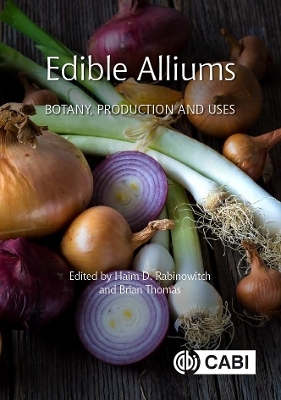
Edible Alliums
CABI Publishing (Verlag)
978-1-78924-997-2 (ISBN)
Allium crops include more than 30 species, many of which (for e.g. onions, shallots, garlic, leeks, bunching onions, and chives) are of economic importance. Bulb onions rank second only to tomatoes in terms of global production. Alliums are farmed and harvested in a range of climatic conditions worldwide, forming important parts of local diets. This book provides a comprehensive review of major and minor Allium crops from scientific and horticultural perspectives. It broadly covers modern biology (including genetics and breeding), propagation, production, processing, and nutritional and health benefits. Edible Alliums contains coverage of: Both major and minor Allium crops. Improving crop production, quality, and sustainability of Allium crops. Advances in digital technologies, 'omics' research and gene editing. Objectives for improving crop performance, such as integrated crop management, the plant-soil interface, improving propagation materials, post-harvest quality and reducing waste. This is an essential resource for scholars, researchers and students in plant science and agriculture, in addition to molecular biologists, plant breeders, agronomists, consultants, and extension specialists.
Haim D Rabinowitch (Edited By) Haim obtained his academic education in plant physiology and genetics at the Hebrew University of Jerusalem. He worked as a Postdoctoral Scientist at The John Innes Institute (Norwich England) and at the Wageningen Agricultural University (Holland) before recruited as a staff member at the Hebrew University of Jerusalem. He spent three sabbaticals at Duke University Medical Centre, Department of Biochemistry. In addition to research, teaching, and supervision, Haim served as elected Head of the Department of Field and Vegetable Crops, elected Head of Faculty Research Committee, elected Faculty Dean and elected University Rector. His research interests include physiology of vegetable crops with special emphasis on flowering, setting and seed production; Physiology and potato breeding. Haim shared the idea and actual introduction of genes for long keeping in tomatoes, the development and introduction of cherry tomatoes as a standard commodity, and later that of cluster tomatoes. He headed a leading ream of plant breeders and released more than a hundred salad and cherry tomato hybrids, as well as short-day onion hybrids, short day seed propagated shallot hybrids, and currently he jointly leads a large-scale garlic breeding program aiming at seed propagated hybrid garlic. He supervised about 80 graduate students, published about 150 scientific papers, chapters in books and edited books on alliums. Brian Thomas (Edited By) Brian obtained his first degree in Botany and a Ph.D. in Plant Physiology at UCW Aberystwyth. He worked as a Postdoctoral Scientist at Carleton University, Ottawa and the University of Reading before becoming a research scientist at the Glasshouse Crops Research Institute in Littlehampton. He moved to Wellesbourne as part of Horticulture Research International (HRI), where he was Research Director. HRI became part of the University of Warwick in 2004, where Brian is Professor of Crop Development in the School of Life Sciences. His research interests include mechanisms by which plants interact with the environment and the practical consequences of these interactions, vegetable crop improvement, and climate change and crop development. He is currently Senior Editor in the Journal of Horticultural Science & Biotechnology and Senior Editor for both first and second editions of The Encyclopaedia of Applied Plant Sciences
1: Introduction to Edible Alliums: Evolution, Classification and Domestication. Nikolai Friesen 2: A Review on Allium Biodiversity. Andrés Bermúdez, Jesús Martín, Turgay Unver, Pilar Hernández, and Gabriel Dorado. 3: Composition, Nutritional and Health Benefits. Abdul Karim Darkal, Muhammad Sarfraz, Muhammad Jawad Nasim, Yannick Ney, Rahman Shah Zaib Saleem, and Claus Jacob 4: Crop Development – Onion . Brian Thomas 5: Crop Development – Shallot. Rina Kamenetsky-Goldstein and Einat Shemesh-Mayer 6: Crop Development – Garlic. Rina Kamenetsky Goldstein and Einat Shemesh-Mayer 7: Bunching Onion. Atsushi Yamasaki and Hikaru Tsukazaki 8: Leek and Other Main Allium ampeloprasum Crops. Haim D. Rabinowitch 9: Chives (Allium schoenoprasum). Haim D. Rabinowitch and Brian Thomas 10: Crop Development – Chinese Chive. Yoshihiro Imahori 11: Agronomy and Production of Edible Alliums. Irwin L. Goldman 12: Onion Seed Production. Ross Peters 13: Crop Protection. Edivânio R. Araújo, Renata S. Resende and Mirtes F. Lima 14: Trait Genetics. Kiran Khandagale, Dhananjay Shirsat, Avinash Ade, Ashwini Benke, Pranjali Gedam, Pragati Randive, Suresh Gawande and Major Singh 15: Nuclear and Cytoplasmic Genomics. Mostafa Abdelrahman and Masayoshi Shigyo 16: Metabolomics of Allium. Kavita Sharma, Sarah Almulla, Neelima Mahato, Samjhana Pradhan, Sameena Mateen and Srinath Pashikanti 17: Molecular Breeding in Allium. Anil Khar 18: Future Prospects for Allium Crops. Brian Thomas and Haim D. Rabinowitch
| Erscheinungsdatum | 13.01.2023 |
|---|---|
| Reihe/Serie | Botany, Production and Uses |
| Co-Autor | Avinash Ade, Sarah Almulla, Edivânio R. Araújo |
| Verlagsort | Wallingford |
| Sprache | englisch |
| Maße | 172 x 244 mm |
| Gewicht | 967 g |
| Themenwelt | Naturwissenschaften ► Biologie ► Botanik |
| Weitere Fachgebiete ► Land- / Forstwirtschaft / Fischerei | |
| ISBN-10 | 1-78924-997-X / 178924997X |
| ISBN-13 | 978-1-78924-997-2 / 9781789249972 |
| Zustand | Neuware |
| Informationen gemäß Produktsicherheitsverordnung (GPSR) | |
| Haben Sie eine Frage zum Produkt? |
aus dem Bereich


